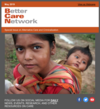This issue of the BCN Newsletter focuses on the criminalization of children and young people with experience of alternative care, highlighting research and other resources that point to the higher likelihood of involvement in the criminal justice system among care-experienced young people in several countries. The issue also features several new resources including the 2018 State of the Social Service Workforce Report and UNICEF's Guidelines to Strengthen the Social Service Workforce for Child Protection.
The literature featured in the focus section indicates that children in out-of-home care in many countries have higher rates of criminal justice involvement, either while in care or after they have left care, than do their peers. For example, in the UK, looked after children (who have been looked after for at least 12 months) are five times more likely to offend than all children, according to the Department for Education.
While the resources in this focus section describe research conducted only in high-income countries - primarily in Northern Europe, North America and Australia - the findings are nonetheless relevant to other contexts as they point to the ways in which placement in alternative care can be associated with a higher likelihood of involvement in the criminal justice system, and the impacts of different children's care settings on longer-term outcomes such as criminalization.

